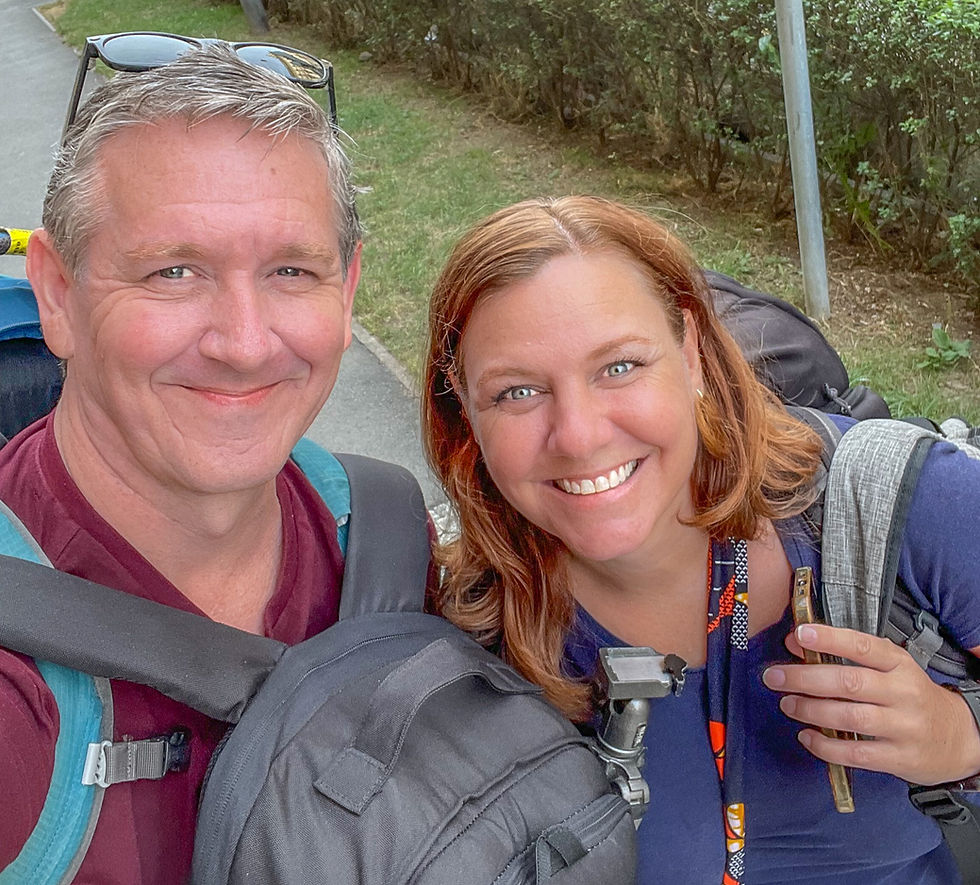Dealing with Touts in Luxor: Why Saying No Matters
- Rand Blimes

- May 31, 2025
- 5 min read

Luxor is astounding.
Even in a country as saturated in wonders as Egypt, Luxor stands apart. There are strolls beside the Nile that feel like walking alongside history itself. There are temples so massive they seem carved from myth, and tombs whose walls still shimmer with color after thousands of years. And if you find a good muhammara, it just might change your opinion of walnuts forever.
But every destination has its complications.
The first one in Luxor is obvious: the heat. In July, it didn’t just sizzle. It enveloped. The sun bore down like a personal vendetta. Walking outside felt like volunteering to step into the blast zone of a high-powered hair dryer.
The second challenge? The touts. Dealing with touts in Luxor takes a special kind of stubbornness.
We’re not new to the tout game.
We’ve spent months navigating the tout-rich environments of India and Southeast Asia. I’ve wandered Bangkok’s back alleys more times than I can count. I know the rhythm of a pitch. I know the art of the firm-but-polite “no.” I even have a tactic I perfected in Asia: when a tout just won’t give up, I turn the tables. I pull out a random piece of pocket trash—a receipt, a bottle cap, anything—and try to sell it to them using their own logic. In Southeast Asia, that usually got a laugh. A shared joke. Then they’d move on.
That didn’t work in Egypt.
Apparently, my sense of humor doesn’t translate there.
Instead, I simply had to draw inspiration from the glyphs we saw written everywhere throughout Luxor:
𓋹 Ankh—life
𓊽 Djed—stability, support, constant
𓌀 Whas—power, control
In Luxor in the summer of 2023, things were slow. The heat hovering around 45°C (113°F). Egypt had been surrounded by both economic and security concerns in the previous years. Tourism was still struggling to bounce back after COVID. So, there were more touts than tourists on the streets of Luxor. And that shifted the dynamic. Normally, a tout will move on when it’s clear they’re not making a sale. But in Luxor, there was often no one else to approach. Once they found you, you were their only lead.
Once a tout approached you, you were then involved in a long-term relationship.
Some days, it felt like we couldn’t walk a block without gaining a shadow. And the worst offenders were the horse carriage drivers. You’d be walking beside the Nile, and a carriage would pull up beside you like it had been summoned. No matter how many times you declined, the driver would keep calling out. Sometimes you could escape by darting across the street, but the streets in Luxor are wide, congested, and long. You’d look down the road for a crossing and see nothing but sun, and smog, hear nothing but the clopping persistence of hooves.
At one point, we hired a carriage—partly out of curiosity, partly out of tactical surrender. The best way to keep from being bothered by drivers, was to hire one.
When I hired our driver, I told him that I knew the way these rides often came out. That once we agreed on a price to take us to our hotel, he would tell us we needed to take a quick detour and we would find ourselves in a shop getting a hard sell for a bit of papyrus, or a carpet, or a pet asp.
“No stops. Just to our hotel, OK?”
“Sure, sure! No problem, my friend!”
And then, once we were on our way: “I take you to a special shop,” he said.
To be clear, this driver had excellent English. There was no misunderstanding here.
I sighed. I replied politely but firmly: “No, we just want to go to the hotel.”
He nodded and smiled and said, “Just a quick look.”
I said no again.
“They make a special price for you,” he tried.
I insisted—firmly now—that we didn’t want to shop.
He took us to the shop anyway.
We refused to get out. He refused to move.
We just sat there looking at each other for a while. No one moved.
So we jumped down from the carriage, even though he’d only taken us halfway to our hotel. I offered him half the fare. He wouldn’t take it. So I set it down on the carriage and walked away.
He followed us.
At first he apologized—something we noticed was a frequent move when a scam was caught mid-play. When he realized we weren’t getting back in, the mood shifted. He demanded the rest of the fare. We kept walking. He shouted. He threatened. He fumed.
We just ignored him.
Eventually, he called me a “crazy man” and rode off.
Now, I understand this was an easier position for me to take, as a fairly large male, than it would be for many other travelers. Please always choose safety first. But also know that part of some tout’s game is to put people in a position where they can intimidate you into giving them more than you bargained for. Be careful.
And look, I get it.
These touts are trying to make a living under very difficult circumstances. Tourism is unpredictable. The summer was brutal. Egypt’s economy had been under enormous strain. I have sympathy—real sympathy—for people just trying to feed their families. And I understand why some resort to aggressive or even dishonest tactics to hustle up some extra income.
But understanding isn’t the same as accepting.
Because when those tactics start to pay off—when travelers agree to things they don’t want, pay full fare for half service, or follow along just to avoid a scene—dishonest behavior gets rewarded. And as long as it works, it will continue.
The only way it changes is if it stops working.
That doesn’t mean yelling. It doesn’t have to mean making a scene. It just means holding the line. Calmly. Firmly. Publicly. Because when dishonesty becomes a liability instead of a benefit, even the most persistent tout will find a different strategy.
When you can, call out dishonest behavior. Make sure there is a cost for dishonesty. Make sure other touts know that you won’t use their services because of the dishonest among them.
So if a carriage driver calls you a “crazy man” for standing your ground, wear it like a badge. You just did your part in making honesty a better investment. After all, this is Luxor—a city built on the ancient values of life, stability, and power. And sometimes, the smallest acts of resistance help you reclaim a bit of all three—because travel should help us develop lives where we have the power to say what needs to be said, and the stability to stand behind it.




Comments